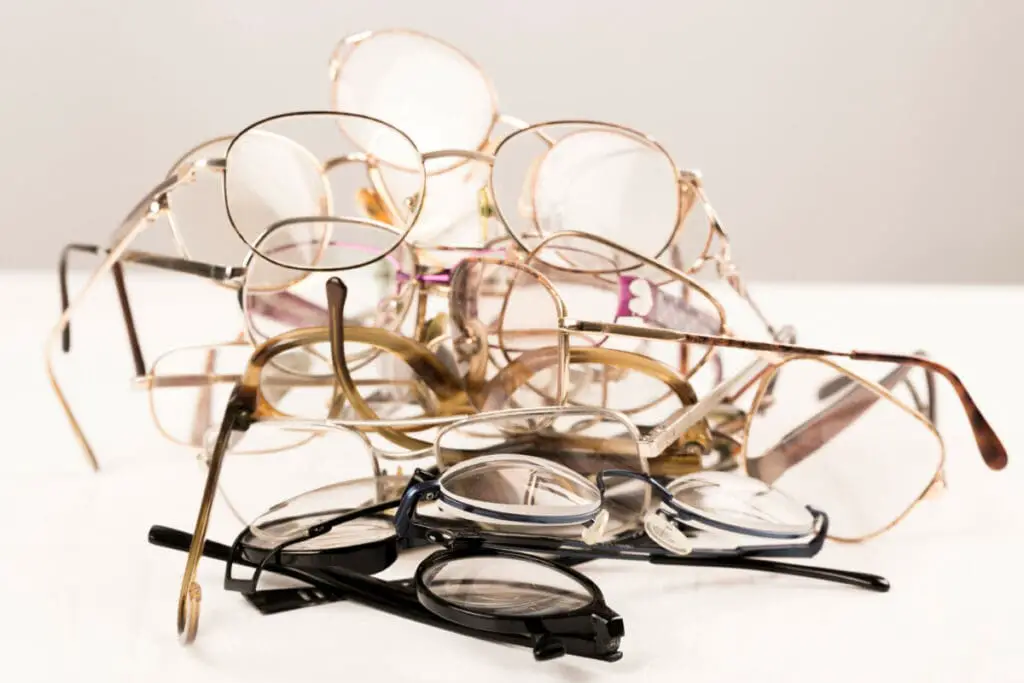
Every couple of years, millions of people discard old glasses and purchase new frames. With almost 65% of people in America using eyewear, that’s a lot of old glasses going into random drawers, forgotten pockets, and trash bins.
The best thing to do with old glasses is to donate them to an organization that repurposes old frames for people in need. Depending on the material of the frames and lenses, used glasses can also fetch a pretty decent price if sold online. Glasses can also be recycled, but it’s a tricky process.
Whatever you do, don’t throw your old glasses away. There are billions of people around the world in need of eyecare, and by selling or donating your frames you can help provide another person with access to the glasses they need.
Why You Should Donate Your Glasses
In the world today, it is estimated that up to 75% of people require some sort of vision care, according to The Vision Council. The vast majority of people who wear corrective lenses opt for glasses instead of contacts, which means that millions of old frames and unused spectacles are discarded every year or two as people upgrade prescriptions and buy new pairs.
Your ability to see completely shapes your way of life. Imagine trying to attend school, go to work, or even drive a car, all without being able to see clearly. It would be incredibly difficult to keep up with the tasks at hand—in some cases, practically impossible! For many people, eyecare is too expensive or inaccessible, and their quality of life is impacted in countless ways.
By donating your glasses, you can help provide someone else with corrective lenses that could completely change their life. It might seem like your prescription is too unique to be useful to someone else, or like your frames are too old to be used anymore. But when you donate your glasses at any drop-off location managed by a charitable organization, that’s only the beginning of the process.
From there, your glasses are cleaned, repaired if necessary, assessed for prescription type and quality, and shipped to facilities that administer free or affordable eye exams to people in need. After an eye exam, these patients can then choose a set of donated glasses that have been given new life and purpose. It makes a world of difference, and you got to be a part of it!
Where to Donate Old Glasses

Now that your eyes have been opened to the amazing opportunity that is donating your old glasses, you’re probably wondering, “Okay, that’s all well and good, but where do I take them?” Well, you’re in luck. The nice thing about donating old glasses is that it is super easy, barely an inconvenience.
Any optometrist, vision care center, or participating retailer will be happy to accept your old glasses or direct you to the nearest place where you will be able to donate them. Just save your old glasses for the next time you have an eye exam and bring them with you. Or, bring them to a thrift store, like Goodwill or the Salvation Army; most thrift stores partner with charitable programs and other nonprofit organizations that provide eyecare for low-income citizens. Even supermarkets like Walmart and Sam’s Club will often have donation bins.
Another popular organization, found at any of America’s Best Contacts & Eyeglasses locations, is Lions Club International. Lions Club donation boxes are bright yellow and blue—you can’t miss them. All you do is put your old frames in the box and they’ll take care of the maintenance, repair, and distribution from there! They love to get sunglasses, too, especially for people living in warm countries where the sun shines brightly for the majority of the day.
And, as always, the internet is your friend. Online nonprofit organizations like New Eyes or ReSpectacle accept mail-in donations from wherever you may live.
As a side note, you may be able to qualify for a tax deduction if you donate particularly valuable glasses. Once they’ve been worn, glasses depreciate in value, but if you donate them to a qualified organization, the write-off is valid. If you purchase a pair of glasses and they cost more than $250, be sure to get a physical or written receipt that you can use a few years down the road to potentially sell and write them off.
Are Old Glasses Worth Anything?

So, talking about money got you thinking, huh? If you’re wondering whether your old glasses are worth selling, the answer is: maybe. It depends heavily on what your glasses are made of and how old they are. If the material for your glasses was fairly cheap (plastic frames and lenses) chances are you’re better off just donating them. However, if your frames were made with gold, rhinestones, pearls, or silver trim, you may be dealing with something worth quite a bit.
Starting in the 1940s, eyewear began to be marketed as a fashion item; celebrities and upper-class citizens alike began to endorse and show off glitzy specs, which means that if you have inherited an old pair of glasses, they could more than likely fetch a pretty penny at most vintage stores. As always, you can try selling your old glasses online, but the best way to know whether it is even worth your time is to get an appraisal from an expert at a vintage store or pawn shop.
Can Glasses Be Recycled?
Short answer: Yes. Long answer: No.
I’ll explain.
Yes, glasses are often made of recyclable materials like aluminum, plastic, gold, glass, etc. The problem is that these materials are, more often than not, pretty difficult to separate and process at recycling facilities. Lenses and frames may be made out of such an intricate combination of both plastic and glass or plastic and metal that it is just not worth the hassle. Rather than deal with the meticulous process, recycling facilities will most often just encourage you to donate your old frames. This is the quickest and easiest way to guarantee that they are contributing to a good cause.
If you know that your optician sold you glasses made out of pure material, such as purely aluminum frames or purely glass lenses, then by all means pop out the lenses and recycle the parts separately. That’s easy enough!
Related Topics:
If you like the article above, here are some other similar articles you should check out!
What Should I Do with Expired Passports
